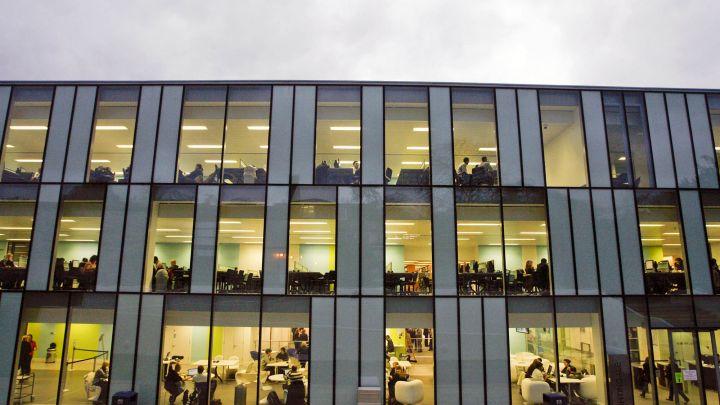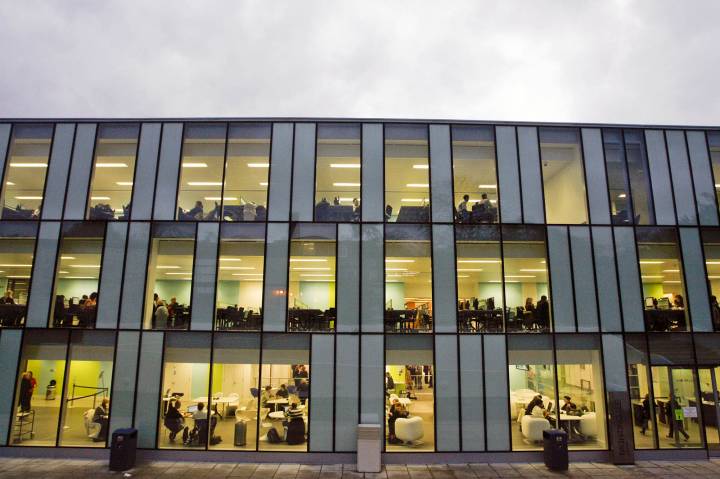Institutional and self-stigma as barriers to accessing services for children and adolescents with neurodevelopmental and complex mental health needs, and their families. What next?

This event has taken place
View all upcoming events at Kingston University.
Time: 9.00am - 5.00pm
Price:
free

Six PhD students based in the Department of Psychology at Kingston University have collaborated to create this webinar. They all work across different areas in Applied Psychology involving vulnerable groups such as young people with autism, special needs, eating disorders, conduct problems, and post-traumatic stress disorder. This is a collaborative effort, supervised by Dr Maria Livanou and Professor Muthanna Samara, that brings together academics, practitioners, experts by experience and postgraduate students and aims to help all stakeholders to increase knowledge around self-and institutional stigma and participate actively in this dialogue with input from the audience.
Stigma in vulnerable groups comprises an ongoing and perpetuating risk factor to accessing mental health services and seeking professional help during crisis. This webinar provides a unique and current opportunity to change the scope and self-narrative of stigma in young people with complex needs and neuroatypicalities by valuing their lived experience and voicing their concerns to transform existing policies and practice in the long-term. Our speakers include a principal lecturer and critical disability researcher, Dr Karl Nunkoosing, and five experts in the areas of stigma, visual impairment, eating disorders and conduct problems, with live Q&A. Through this dialogue, we aim to explore the contributing factors to stigmatising and help-seeking behaviours, and identify gaps in policy, clinical, and educational practices.
This webinar is free and open to all. It will be hosted on Microsoft Teams and the link to the Teams meeting will be included in your order confirmation email once you have booked.
Schedule:
8:50-9:00am: Session opens
9:00-9:05am: Introduction by Chairs (Dr Maria Livanou and Professor Muthanna Samara)
9:05-9:50am: "Are you looking at me? Stigma, Self-stigma, Resistance" by Keynote Speaker Dr Karl Nunkoosing, Principal Lecturer and Critical Disability Researcher, University of Portsmouth
9:50-10:05am: Q&A and comfort break
10:05-10:30am: "Shining the Light on Mental Health Stigma: Making the Future" Joint presentation by PhD research candidates – Alaa Albawab, Marcus Bull, Anya Heneghan, Ifigeneia Manitsa, Norlina Sexton, Hayley Spurin
10:30-10:45am: Q&A and comfort break
10:45-11:30am: "Please, let me be me" by Ms Yvonne Trigg, Neurodiversity and Disability Non-Medical Help Tutor/Mentor
11:30-11:45am: Q&A and comfort break
11:45am-12:30pm "Is it me or is it my nystagmus?": The social and emotional impact of nystagmus for children and young people and why the Nystagmus Network continues to raise awareness of the condition. Sue Ricketts, Executive Information and Development Manager of the Nystagmus Network.
12:30-1:30pm: Lunch break
1:30-2:15pm: "Navigating Stigma" by Mrs Norlina Sexton, parent with lived experience, PhD research candidate and Neurodiversity study skills tutor.
2:15-2:30pm: Q&A and comfort break
2:30-3:15pm: "Not all Eating Disorders are Visible" by Hope Virgo, Author, Multi Award Winning Mental Health Campaigner and founder of #DumpTheScales
3:15-3:30pm: Q&A and comfort break
3:30-4:15pm: "The Diagnoses That Must Not Be Named: Psychopathy and Conduct Disorder" by Ms Lillyth Quillan
4:15-5:00pm: Questions, Discussions, Roundup
Keynote speaker abstract
Are you looking at me? Stigma, Self-stigma, Resistance by Dr Karl Nunkoosing
Goffman's 1963 classic was produced before identity politics, critical race studies, gender studies, critical disability studies, mad studies, and crip studies. What lessons have we learned from queer, crip and fat theorists to subvert a stigma and embrace a spoilt identity?
We are all engaged in the business of stigmatising and othering, as well as being othered ourselves. We are all victims and perpetrator of stigma. It is a human tendency to categorise. What is it that makes a category a ‘barer of a spoilt identity'? Things become signs when we give them meanings. A thing, an attribute, an experience, an event and so on can become a stigma when we make something of it, when we give it meanings that is discrediting. We give meanings to certain signs of human differences that have the capacity to reduce the worth of the barer of such signs. The stigmatised person can either accept or resist such disdain. A useful concept here is ‘rejection'; who is at risk of being rejected?
A version of acceptance of the spoilt status is the notion of ‘self-stigma'. The complexity here is that the barer of the stigmatised signs accepts and applies to themselves the negative stereotypical view of their society. This phenomenon has often been associated with the notion of a compromised self-esteem. The focus of research has mainly been on mental illness. To what extent is the observed low self-esteem a component of the compromised mental health? The concept of Rejection-Identification explains how a stigmatised group membership can be both a source of psychological distress as well as a resource to enhance wellbeing. I wonder about the extent that self-stigma is part of a process that led to acceptance and eventually resistance.
Stigma is relational. Both the stigmatised and the ‘stigmatiser' are trapped in the same web of power-knowledge. Disguising or hiding or managing a potentially stigmatising sign is as much to do with sparing the starer's discomfort as it is to do with managing the risk of being stigmatised. The stigmatiser has the power to make the stigmatised feel inferior or incompetent. How do an understanding of shame and humiliation help us to make sense of this relationship?
Critical Disability Studies twin concepts of ableism and disablism have the potential to explain why stigma exist. Such explanations are necessary to our understanding of the process of resisting a spoilt identity. I shall examine the relationship between social action and language and draw on the lessons we can learn from the activists of the Neurodiversity movement.
Guest speakers
Ms Yvonne Trigg
"Please, let me be me"
Yvonne trained and has taught in secondary schools around the country. Her early experiences of working within a multi-cultural, inner-city school, seeking to integrate hearing impaired students into mainstream education, led to a growing interest in inclusion.
Working as a teacher with the Inclusion Service opened her eyes to the broader difficulties facing young people falling outside the narrow parameters mainstream education caters to, as well as the struggles and isolation faced by families and carers.
As SENCo with responsibility for students with ‘Behaviour, Social and Emotional Difficulties' (now known as Social Emotional and Mental Health) in a large, socially deprived housing estate, the challenges faced by staff championing inclusion were immense; for the young people they were often crushing.
Sensitive to the background challenges many students will have experienced during school and college, in 2013 Yvonne moved to work with neurodiverse students in Higher Education. The ever-growing family, community, societal pressures to ‘fit' can snow-ball until individuals, with huge potential, doubt their capacity to feel valued or be recognised for all they are. It is a joy for this Specialist Tutor/Mentor to share their journey to identify, call out and challenge the barriers they face; to become the humans they were meant to be!
"Is it me or is it my nystagmus?": The social and emotional impact of nystagmus for children and young people and why the Nystagmus Network continues to raise awareness of the condition.
Sue is the Executive Information and Development Manager with the Nystagmus Network, a registered charity in England and Wales. The organisation's charitable objectives are to provide support and information to everyone living with nystagmus, to raise awareness of the condition in the wider community and to foster and fund research. The charity represents the biggest nystagmus patient group in Europe.
Sue is privileged to work alongside researchers, clinicians and teachers and, just as importantly to her, people living with nystagmus. She is passionate about raising awareness of nystagmus and its impact on quality of life and making the voices heard of the community she feels privileged to represent.
Previously, Sue, who is a qualified and experienced post-19 teacher/trainer, enjoyed a long and successful career in adult, community and, latterly, secondary education in both teaching and leadership/management roles. She is the parent of an adult daughter with congenital nystagmus.
"Navigating Stigma"
Norlina completed her Computer Science undergraduate degree in Melbourne, Australia. She then spent ten years working in the IT industry in both software development and sales/marketing capacities. Upon relocating to the UK, Norlina subsequently retrained to become a specialist teacher and assessor for learners with Specific Learning Differences. She is a full member of PATOSS and a holder of Assessment Practising Certificate since 2007. Norlina has in the past fifteen years worked in primary, secondary, and Higher Education settings in facilitating study skills and independent learning, which she continues to do up to today. Fairly recently, Norlina completed a Counselling Skills and Theory course followed by the MSc Psychology (conversion) course. She is particularly interested in enabling neuro-divergent students shift from negative to positive self-belief in developing new confidence in their identity and fulfilling their potential. Norlina's experience working with neuro-divergent students and family members has given her the means to connect and understand their struggles with embracing university. Her PhD research aims to co-design, develop, and test the feasibility of a newly developed autism transition programme using mixed methods.
"Not all Eating Disorders are Visible"
Hope Virgo is an author and multi award winning campaigner for people with eating disorders. Through her talks, Hope helps young people and employers (including schools, hospitals and businesses) deal with the rising tide of mental health issues. Hope is also a recognised media spokesperson, having appeared on various platforms including BBC Newsnight, Good Morning Britain, Sky News, BBC Breakfast and BBC News. She has published two books including best-seller Stand Tall Little Girl, documenting her eating disorder journey. Hope's third book; "You are Free" is out in May 2022 which tackles issues around mental health and faith. In 2018, Hope launched #DumpTheScales which called on the government to stop using BMI as the primary measure to determine whether someone with an eating disorder would qualify for NHS support. Her petition generated over 116,000 signatures and was delivered to Number 10 Downing Street. The #DumpTheScales campaign which put eating disorders on the Government's agenda has gone from strength to strength making change happen on a national scale.
Ms Lillyth Quillan
"The Diagnoses That Must Not Be Named: Psychopathy and Conduct Disorder"
LinkedIn / Twitter / Psychopathy Is Youtube series
Lillyth Quillan was the first parent to publicly use her name and her face and say she was the mother of a child with Conduct Disorder. In 2014, she created and founded Parents of Children with Conduct Disorder (PCCD), a Facebook-based support group for parents and other caregivers of these children. Over the last seven years, Lillyth has personally spoken or communicated with thousands of families. She remains as dedicated to the cause of including non-intimate partner violence in the national Domestic Violence conversation, early treatment for our children, and political action as the day she started PCCD.
She has been featured on the Today show, CBC's Creating Conscience, the New York Post, written a piece in The Atlantic online, and regularly contributes articles to Psychopathy Is where she is on the Board of Advisors.
PhD organisers
Supervisors
Dr Maria Livanou, Senior Lecturer (Department of Psychology at Kingston University, London)
Professor Muthanna Samara (Department of Psychology at Kingston University London)
Booking is essential to attend this event.
For further information about this event:
Contact: Dr Maria Livanou
Email: M.Livanou@kingston.ac.uk
